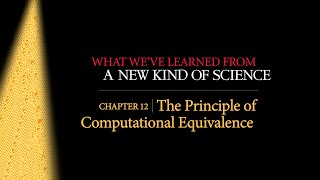
Searching and Sorting Algorithms (part 4 of 4)
Introductory coverage of basic searching and sorting algorithms, as well as a rudimentary overview of Big-O algorithm analysis. Part of a larger series teaching programming at http://codeschool.org
From playlist Searching and Sorting Algorithms

The mother of all representer theorems for inverse problems & machine learning - Michael Unser
This workshop - organised under the auspices of the Isaac Newton Institute on “Approximation, sampling and compression in data science” — brings together leading researchers in the general fields of mathematics, statistics, computer science and engineering. About the event The workshop ai
From playlist Mathematics of data: Structured representations for sensing, approximation and learning

Solving Equations Using Multiplication or Division
This video is about Solving Equations with Multiplication and Division
From playlist Equations and Inequalities

Using Clocks to Solve Fractions String 2
Another introductory video using clocks to understand fractions
From playlist Arithmetic and Pre-Algebra: Fractions, Decimals and Percents

Hands on learning of computational theory for software developers from all walks of life. Using semantics and the barebones of the Ruby programming language, learn the meaning of programs and why specific algorithms do their job.
From playlist Programming Podcast

Using Clocks to Solve Fractions String 6
Here we use the clock model to deal with 3/18 and 3/9
From playlist Arithmetic and Pre-Algebra: Fractions, Decimals and Percents

Using Clocks to Solve Fractions String 1
Using a clock model and the patterns in a fraction string to make sense of unfriendly fractions
From playlist Arithmetic and Pre-Algebra: Fractions, Decimals and Percents

Algorithms Explained: Computational Complexity
An overview of computational complexity including the basics of big O notation and common time complexities with examples of each. Understanding computational complexity is vital to understanding algorithms and why certain constructions or implementations are better than others. Even if y
From playlist Algorithms Explained

Dr David Skinner - "Computers could have been different." - 1980s Home Computing Boom
Dr David Skinner of Anglia Ruskin University talks from an academic perspective about the 1980s home computing boom.
From playlist Viva Computer!

The Map of Quantum Computing | Quantum Computers Explained
An excellent summary of the field of quantum computing. Find out more about Qiskit at https://qiskit.org and their YouTube channel https://www.youtube.com/c/qiskit And get the poster here: https://store.dftba.com/collections/domain-of-science/products/map-of-quantum-computing With this vi
From playlist Quantum Physics Videos - Domain of Science

Celebrating a Third of a Century of Mathematica, and Looking Forward
While not quite October 23, 2021 12:00:00 PM PDT (June 23rd at Noon PDT the official launch date), we're celebrating Mathematica's 1/3 century birthday! Blog available here: https://writings.stephenwolfram.com/2021/10/celebrating-a-third-of-a-century-of-mathematica-and-looking-forward Or
From playlist Stephen Wolfram Livestreams

Computer Science Vs Computer Engineering: How to Pick the Right Major
STEMerch Store: https://stemerch.com/Support the Channel: https://www.patreon.com/zachstar PayPal(one time donation): https://www.paypal.me/ZachStarYT Versión en español de este video: https://www.youtube.com/watch?v=vxxTQaMOMMk Computer Science Part 1 (Discrete Math): https://www.youtub
From playlist Computer Science/Computer Engineering

Computer History: The Machine that Changed the World Episode 3 -"Paperback Computer"
Here is Episode# 3 of “The Machine that Changed The World.” This excellent 1992, five part series was written and directed by Nancy Linde, produced by WGBH TV Boston and the BBC. Narrated by Will Lyman, famous for FRONTLINE narrations. This episode has some great interviews and film
From playlist Computer History: The Machine that Changed the World

Computer History 1989 “MacAcademy” training NETWORKING (Apple Macintosh AppleTalk Topology LAN PCs)
Vintage Computers (1989) : Apple Macintosh: Original, Unedited, no Ads, “MacAcademy” training video on NETWORKING. An exceptionally clear and detailed explanation of how a network operates, the various topologies (designs) of networks and how to best create and utilize a Mac network.
From playlist Early Microcomputers & PCs

Computer Fundamentals - Basics for Beginners
A computer is an electronic machine that accepts data, stores and processes data into information. The computer is able to work because there are instructions in its memory directing it. The parts of the computer that you can see and touch, such as the keyboard, monitor and the mouse are
From playlist Computer

What We've Learned from NKS Chapter 12: The Principle of Computational Equivalence [Part 1]
In this episode of "What We've Learned from NKS", Stephen Wolfram is counting down to the 20th anniversary of A New Kind of Science with [another] chapter retrospective. If you'd like to contribute to the discussion in future episodes, you can participate through this YouTube channel or th
From playlist Science and Research Livestreams

Lec 18 | MIT RES.6-008 Digital Signal Processing, 1975
Lecture 18: Computation of the discrete Fourier transform, part 1 Instructor: Alan V. Oppenheim View the complete course: http://ocw.mit.edu/RES.6-008 License: Creative Commons BY-NC-SA More information at http://ocw.mit.edu/terms More courses at http://ocw.mit.edu
From playlist MIT RES.6-008 Digital Signal Processing, 1975

22C3: The very early Computer Game History
Speaker: Andreas Lange How the games have become the first digital mass product Andreas Lange will show the very early computer games before they became a commercial product. If you ever want to know, what was really the first game this session will be the right one for you. Andreas Lan
From playlist 22C3: Private Investigations

Using Clocks to Solve Fractions String 3
Using clocks to understand more fraction sums
From playlist Arithmetic and Pre-Algebra: Fractions, Decimals and Percents
